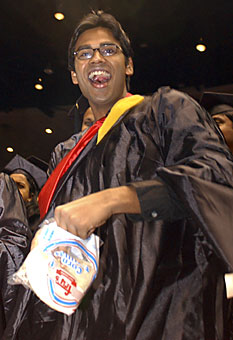 |
|
CHRIS CODUTO/Arizona Daily Wildcat
|
A May 2003 graduate gets ready to fling tortillas at the end of the commencement ceremony. This December's graduation will feature security checkpoints and student marshals to deter the practice.
|
|
|
By Jennifer Amsler
Arizona Daily Wildcat
Wednesday, November 24, 2004
Print this
December's commencement will feature, for the first time, security checkpoints for graduates and members of the audience to deter disruptive behavior to the university-wide ceremony.
In addition, undergraduates and faculty members will stand with graduates before and during the ceremony as marshals, a new feature the Commencement Policy Committee hopes will hold as a tradition.
When the general December commencement ceremony was cancelled in September, UA President Peter Likins reinstated it in an agreement with ASUA President Alistair Chapman to establish a set of guidelines to prevent unruly behavior.
After trying to create a fair balance between students and administrators for setting new commencement regulations, the Commencement Policy Committee agreed to a security checkpoint for graduates and audience members to prevent them from bringing in items such as tortillas, said Steven Eddy, an Associated Students of the University of Arizona Senator.
Chapman said the new security checkpoints will be the most "dramatic change" of commencement.
Security checkpoints will monitor every individual entering McKale Center for the ceremony and will require graduates to unzip their robes, Eddy said.
He said student and faculty marshals were created not solely to regulate behavior but to add to the decorum of the ceremony.
"We are not looking at them as a deterrent for behavior. They really are there to assist the graduates," he said.
Some graduates in past commencements have thrown tortillas, a tradition some guests and audience members find offensive. Students on the Commencement Policy Committee have tried to begin new traditions that will be respectful to graduates, audience members and guests of the university.
Eddy said 30 Student Honor Marshal volunteers will help graduates with their robes at the new security checkpoint.
"Marshals will be checking for items students might bring in such as tortillas, as well as helping them dress," Eddy said. "They will make sure it is not chaotic."
December's commencement will also have at least 40 faculty members who will serve as Faculty Honor Marshals for future commencements.
"This is to increase to the decorum of commencement," Eddy said.
Edith Auslander, the vice president and senior associate to President Likins, said she is on the Commencement Policy Committee and the marshals were implemented to assist and congratulate students.
Auslander said faculty has a low turnout in past years and she said the committee hopes the faculty marshals will change their attendance.
Eddy is a member of the Commencement Policy Committee, a group of ASUA leaders, representatives from each college and members of administration.
Every year, the committee brainstorms ideas for a more enriching, rule-abiding ceremony.
Chapman said he was the only ASUA member on the Commencement Policy Committee before December commencement was canceled and reinstated two months ago, but appointed two more members of ASUA, Eddy and Evan Worle, ASUA university relations director, to join the committee.
ASUA teamed up with representatives from each college to come up with a list of suggestions so graduates' interests could still be reflected in a new, regulated commencement ceremony. ASUA presented their ideas to administrators last month and received feedback last week.
Chapman said when administration began to discuss the cancellation of commencement last summer, he was resistant and "very outnumbered." He said when administrators decided to cancel commencement, they weren't expecting the overwhelming response from students.
"That event catalyzed different groups on campus to make the ceremony better," Chapman said.
The new security checkpoint and student and faculty marshals were the ideas that emerged from the meetings of the Commencement Policy Committee.
The student marshals will march behind graduates in their walk across the Mall to McKale Center, a tradition graduates participate in every year.
The Student Honor Marshals will wear red academic robes and assist graduates through security into McKale Center. The faculty marshals will wear black robes.
CSC, the same company that provides security at UA basketball games, will check everyone entering McKale for items that may be disruptive, such as tortillas, Eddy said.
"In recent years, it hasn't been on the students' shoulders. It's been the audience," he said.
The deadline to apply to be a Student Honor Marshal in December's commencement ceremony is Tuesday.
The Deans of the Colleges will be appointing the Faculty Honor Marshals for the upcoming commencement, but in later years, students will vote on the marshals, Eddy said.
